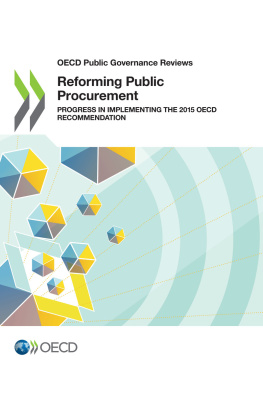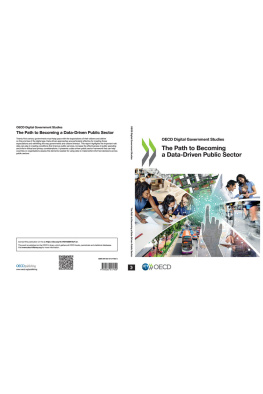OECD - Public Value in Public Service Transformation
Here you can read online OECD - Public Value in Public Service Transformation full text of the book (entire story) in english for free. Download pdf and epub, get meaning, cover and reviews about this ebook. year: 2019, publisher: OECD Publishing, genre: Politics. Description of the work, (preface) as well as reviews are available. Best literature library LitArk.com created for fans of good reading and offers a wide selection of genres:
Romance novel
Science fiction
Adventure
Detective
Science
History
Home and family
Prose
Art
Politics
Computer
Non-fiction
Religion
Business
Children
Humor
Choose a favorite category and find really read worthwhile books. Enjoy immersion in the world of imagination, feel the emotions of the characters or learn something new for yourself, make an fascinating discovery.
Public Value in Public Service Transformation: summary, description and annotation
We offer to read an annotation, description, summary or preface (depends on what the author of the book "Public Value in Public Service Transformation" wrote himself). If you haven't found the necessary information about the book — write in the comments, we will try to find it.
OECD: author's other books
Who wrote Public Value in Public Service Transformation? Find out the surname, the name of the author of the book and a list of all author's works by series.
Public Value in Public Service Transformation — read online for free the complete book (whole text) full work
Below is the text of the book, divided by pages. System saving the place of the last page read, allows you to conveniently read the book "Public Value in Public Service Transformation" online for free, without having to search again every time where you left off. Put a bookmark, and you can go to the page where you finished reading at any time.
Font size:
Interval:
Bookmark:

OECD (2019), Public Value in Public Service Transformation: Working with Change , OECD Publishing, Paris, https://doi.org/10.1787/47c17892-en .
Societies and economies are at the cusp of large-scale transformative changes. The digital revolution alone is changing the way we work, learn and interact with each other. The full consequences of these changes are not yet evident, but they require governments to anticipate working differently in the future, and to plan for that now.
Historically, governments have been reactive responding to hazards and transformations after they have materialised, rather than proactive envisioning future scenarios and planning for them. This has resulted in governments applying known solutions rather than imagining alternative futures and preparing for them (for example by regulating new modes of production or the sharing economy).
Building on the 2017 OECD report, Systems Approaches to Public Sector Challenges: Working with Change, on how to apply systems thinking to complex horizontal policy issues (e.g. tackling child protection, domestic violence, sharing economy) the current report examines how governments can move from a tactical (connected to a method to achieve a goal) to a more holistic approach to system change.
Drawing on diverse case studies from across the world, the report illustrates how a strategic approach to system change implies three key elements: envisioning and acting on the future; putting public value at the core of the change process; and systematically engaging citizens in decision-making.
The empirical cases drawn from actual experiences of select cities - show that a strategic approach to system change in the public sector is possible, but requires strong leadership commitment, enhanced system capabilities and innovative approaches to problem solving in the public sector.
This report was prepared by the OECD Directorate for Public Governance (GOV), under the leadership of Director, Marcos Bonturi.
The report was produced by the Observatory of Public Sector Innovation (OPSI) in the OECD Reform of Public Sector Division (GOV/RPS).
It benefitted from the strategic orientation and revisions of Marco Daglio, Acting Head of Division and lead of the Observatory of Public Sector Innovation Team.
The report was written by Piret Tnurist, Project Manager, Observatory of Public Sector Innovation, OECD, and Justin W. Cook, Senior Lead for Strategy at the Finnish Innovation Fund, SITRA and Member of Rhode Island School of Design, in collaboration with Oriana Romano, Policy Analyst, CFE/CITY, OECD (Chapter 4: Case Study 7). Jamie Berryhill, Policy Analyst, Observatory of Public Sector Innovation, OECD, helped collect data for Case study 4. The report benefitted from input and comments from the Open Government and Digital Government teams in particular Claudia Chwalisz, Alessandro Bellatoni, Craig Matasick, Barbara Ubaldi, Joao Vasconcelos, Jacob Arturo Rivera Perez and Benjamin Welby. Special thanks go to Charles Baubion from the Risk Team for reviewing the report from risk and uncertainty perspective.
The authors are grateful to Liv Gaunt for editorial support, and to all the case owners who shared their experiences and reviewed the case analyses. The report also benefitted from the expertise of the Network of OPSI National Contact Points.
This project has received funding from the European Unions Horizon Research 2020 research and innovation programme under grant agreement No 671526. This project would not have been possible without the support of the innovators and change makers in government that gave their time to participate in the study
The rise of platform economies, new consumption patterns and innovative technologies are transforming both service delivery and peoples lives in general. Smart solutions are entering our everyday lives and digitalisation and datafication of everything is the norm. In political economy, short-term considerations seem to prevail, while long-term challenges with cascading effects (like climate change and demographic shifts) are already being felt. Governments around the world are facing an unprecedented transformation process, where systems that have worked and delivered results in prior decades are being questioned.
This requires governments to engage in systems change in new ways. Indeed, governments need to think about the future in a way that simultaneously leaves options open and focuses on long-term reform priorities. This means moving from a tactical to a strategic approach to system change. Strategic systems thinking means engaging with the future in new ways, considering the input of citizens and understanding the impact of changing public values. With fundamental shifts in societys expected behaviour, the notion of public value is evolving to encompass variables that are hard to codify (e.g. trust, inclusiveness transparency, legitimacy, effectiveness, privacy, accountability). Thus, a more nuanced way to articulate shifts in systems is to look at how the composition of public value transforms during systems change.
The report argues that the way in which public governance will change in the future, will depend on how public sector manages three interdependent aspects:
envisioning and acting on a specific future (making the future actionable);
leading the systemic change process with a public value-based approach (both in directing change, but also analysing the effects of innovative change from a value perspective); and
how democratic the overall process is i.e. how are citizens engaged in the decision making (collective understanding of what kind of future citizens aspire to and what values they hold dear).
Chapter 1 discusses how to think about the future in a changing urban context and how the recent smart governance trend fits the narrative. Chapter 2 analyses the public value domain, outlining the need to frame problems differently and tackles how to use the language of value to do so. Chapter 3 addresses how to engage citizens in this new era. Different key components of the process are outlined, such as risk and uncertainty, participation, deliberation and sortation. By connecting these three topics, the report put forward a new framework for using systems approaches to foster systems change.
Font size:
Interval:
Bookmark:
Similar books «Public Value in Public Service Transformation»
Look at similar books to Public Value in Public Service Transformation. We have selected literature similar in name and meaning in the hope of providing readers with more options to find new, interesting, not yet read works.
Discussion, reviews of the book Public Value in Public Service Transformation and just readers' own opinions. Leave your comments, write what you think about the work, its meaning or the main characters. Specify what exactly you liked and what you didn't like, and why you think so.


















